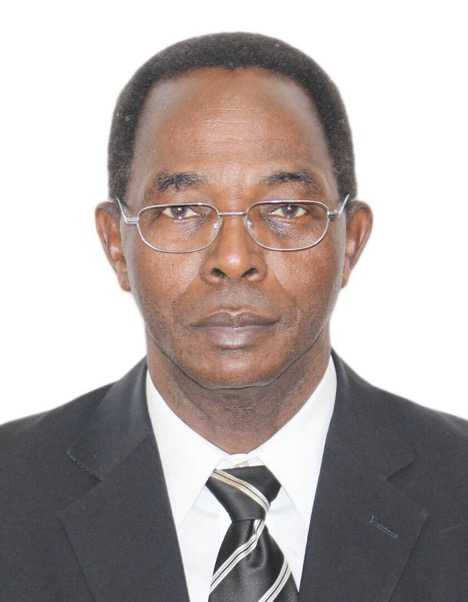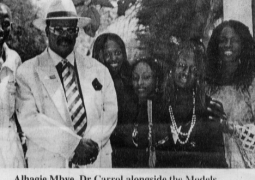
The second President operated a government of benevolent dictatorship with massive infrastructure projects such as Kombo Coastal road network, North Bank and South Bank roads construction, Senegambia bridge, Kerewan bridge, Sankulaykunda bridge, New House of Parliament, GRTS, UTG, major hospitals in Serrekunda, Bwiam, Farafenni, Bundung, more Secondary schools, Sir Dawda international conference center, Sukuta- Jabang highway, Banjul International Airport, Arch 22, ACE project building, 52 Villas for 20006 AU Heads of State Summit and establish many other institutions of State. In education, he personally sponsored Gambian students in UTG, in India, in the USA, in Taiwan, in Canada and elsewhere. He used interventionist measures to contain inflation, control foreign exchange rates, stabilized the market prices by his agriculture initiatives, etc among others. The third and current President reinforced the development drive with massive infrastructure projects in roads, bridges, rural electrification projects in various parts of the country, University extensions in Faraba, Brikama, GTTI in Jeswang, MDI in Kanifing, College in Basse, new major health centers in various parts of the country, electricity expansion projects in Urban Gambia, reconstruction of the streets of Banjul, new VIP Lounge at Banjul international airport, new Maternity and Children’s clinic in Banjul, etc. He hosted the OIC Summit and built OIC roads. In education, he sponsored students at various levels in the country. A new deep sea port project is underway in Sanyang. There are other ongoing projects. We can see from this transitional narrative that the country has maintained its viability, sovereignty and sustainability under three leaderships since Independence.
In recent years however, political opportunism has become an obstacle to good governance in many ways. In political opportunism, there is hardly any accountability and probity in the system. In political opportunism, there is hardly any control over official overseas travels and procurement in general. In political opportunism, promotions in the service and appointments in top positions are hardly merit-based or competence-based. In political opportunism, those whose hands are in the State basin, see their interest as priority over the interest of the State in most cases. When they fall from grace, they become an anti system of government. In political opportunism those who have positions in government tend to jealously guard their positions to the extent that they don’t want the qualified, the competent, the experienced and refined diplomats and professionals to be either near the Presidency or be known and acknowledged by society. In political opportunism, there is no loyalty to the leadership as such but show of permanent interest. In political opportunism, business tycoons usually give donations to most political party leadership as a safeguard in the event of change of government. In political opportunism, the Presidency is given positive news about the country’s external friends and partners when the truth is hidden to their own benefit in some cases. In political opportunism, there are political hypocrites and political betrayers for self-elevation in the Party and in government. In political opportunism, there are sycophants and charlatans who don’t believe in anything other than what they will earn from singing and praising the leadership and the system. In political opportunism, most players in the sweetness of office will not admit to the hard times faced by the people. In political opportunism, there is political bigotry, personality attacks and castigation of political leaders and their supporters. In political opportunism, there are always denials of the truth about the state of affairs in the country. In political opportunism, tribalism is pushed in the Party hierarchy and in government appointments. In political opportunism, critics of the government and its leader can without remorse turn to be praise singers of the same government when their mouths are buttered and when they are given government positions. In political opportunism, the elites fight for top government positions just to build their profiles for international jobs. In political opportunism, most people don’t fear Allah to take tax payers money to build mansions, buy vehicles, fill their homes with all essential commodities while the masses of the people endure poverty and degradation. Such people don’t hesitate to engage in corruption. They do so while pretending to be supportive of the government of the day. Political opportunism in such a manner constitutes obstacles to good governance bcs the funds looted could have gone to meet the felt needs of the people. All these tenets of political opportunism if not watched in the system of government and in political activity, and to apply the breaks where necessary, could constitute obstacles to good governance. Most of these tendencies are prevalent in the body politics of the country. Some of these tendencies do lead to resentment of the people against the government and upheavals within political parties. The lack of National concession on a new constitution is attributable to political opportunism. And so is the controversial 2025 National Budget. And so is the proliferation of political parties in anticipation of political alliances( Coalition) that can earn top positions for some of its members in government. The 2016 Coalition split, the split between the NPP/ APRC alliance and UDP, The recall of most of the Ambassadors in the Jammeh era to come home, the split of APRC into two factions, the advocacy for Barrow for third term, the attachment of position seekers to influencers at the State House, the crosscarpetings between political Parties, etc are all imbued in political opportunism. When the political environment becomes toxic and ill-conceived policy decisions and choices become rampant in the system, it is largely as a result of political opportunism. It is always an obstacle to good governance. It sends the country in the wrong direction and derails the development process to some extent. The government of the day must be watchful of these developments from now until the end 2026. Existing political parties must be weary of political opportunism that will derail their action plans and activities. Political opportunism and its negative effects on governance must be in the spotlight in the National discourse. Regardless of political affiliations, Gambians cannot afford to miss the road to the consolidation of democracy and the drive towards building a better country.
For four years now, there is no National consensus on a new constitution. The contentious 2025 National Budget has sent shock waves in the national discourse. It was frightening that the said budget was not debated in Parliament according to reports, for political reasons obviously. Political crosscarpetings with its accompanying ramifications have generated political antagonisms and rivalry between political parties and among political supporters. The emergence of new political Parties with rhetoric on putting the ruling government in bad light for political gains, wrong advises to shield the truth about ground realties from the head of the ruling Party, opposition accusations on some aspects of governance without real proofs, fiscal indiscipline for political and personal enrichment, internal struggles for influence and rewards in political organizations, etc are all tenets of political opportunism which does not augur well with good governance. Those who stand in the way of good governance due to political opportunism are selfish and in moral bankruptcy and unfair to the people of this country. Political opportunism as an obstacle to good governance will not steer the country in the right direction. The situation must be contained so that sanity will prevail in the running of the country. We have achieved a lot since the first republic to date in terms of progress. Political decisiveness to move the country forward from this new year is governance imperative.
Telling unfounded stories to the President to cover up official wrong doings, incompetence, dirty hands in State covers and leaking state secrets are common features of political opportunism. These are some of the obstacles to good governance for which wise counseling is paramount. Gambians cannot afford to miss the road to the consolidation of democracy and the drive towards building a better country.
Read Other Articles In Opinion

Tribute to Dr. Henry D.R. Carrol: The quintessential renaissance man of letters
Oct 31, 2023, 10:11 AM



